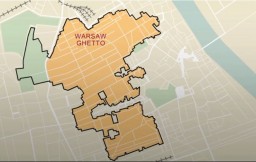You searched for: Concentration camps
<< Previous | Displaying results 1051-1060 of 1116 for "Concentration camps" | Next >>
-
Thomas Buergenthal discusses quote from Abel Herzberg
Oral History"There were not six million Jews murdered; there was one murder, six million times."Holocaust survivor Abel Herzberg Judge Thomas Buergenthal was one of the youngest survivors of the Auschwitz and Sachsenhausen concentration camps. He immigrated to the United States at the age of 17. Judge Buergenthal devoted his life to international and human rights law. He served as chairman of the United States Holocaust Memorial Museum’s Committee on Conscience; was named the Lobingier Professor of Comparative Law…
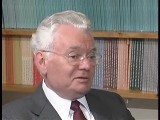
-
Thomas Buergenthal describes international tribunals
Oral HistoryJudge Thomas Buergenthal was one of the youngest survivors of the Auschwitz and Sachsenhausen concentration camps. He immigrated to the United States at the age of 17. Judge Buergenthal devoted his life to international and human rights law. He served as chairman of the United States Holocaust Memorial Museum’s Committee on Conscience; was named the Lobingier Professor of Comparative Law and Jurisprudence at the George Washington University Law School; and served for a decade as the American judge at…
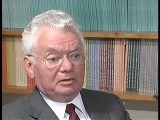
-
Thomas Buergenthal reflects on the importance of memorials
Oral HistoryJudge Thomas Buergenthal was one of the youngest survivors of the Auschwitz and Sachsenhausen concentration camps. He immigrated to the United States at the age of 17. Judge Buergenthal devoted his life to international and human rights law. He served as chairman of the United States Holocaust Memorial Museum’s Committee on Conscience; was named the Lobingier Professor of Comparative Law and Jurisprudence at the George Washington University Law School; and served for a decade as the American judge at…
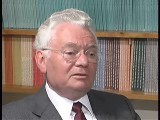
-
Belle Mayer Zeck describes research about IG Farben for the postwar trial
Oral HistoryBelle Mayer trained as a lawyer and worked for the General Counsel of the US Treasury, Foreign Funds Control Bureau. This bureau worked to enforce the Trading With the Enemy Act passed by Congress. In this capacity, Mayer became familiar with the German I. G. Farben chemical company, a large conglomerate that used slave labor during World War II. In 1945, Mayer was sent as a Department of Treasury representative to the postwar London Conference. She was present as representatives from the Allied nations…
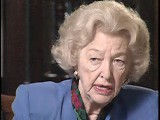
-
Historian Peter Black describes the value of eyewitness testimony
Oral HistoryIn the 1980s and 1990s, historian Peter Black worked for the US Department of Justice Office of Special Investigations, as part of a team tracking and prosecuting suspected war criminals. Black later served as the Senior Historian at the United States Holocaust Memorial Museum
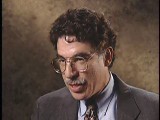
-
Robert Mills Donihi describes defendants at the postwar US trials in Germany
Oral HistoryIn 1945, Robert Mills Donihi was practicing law in Nashville, Tennessee. He accepted a government assignment to Tokyo where he worked on the trial of 28 high-ranking Japanese officers. After a year, he left for Germany, and arrived in Nuremberg in January 1947. Donihi was a member of the legal team at the postwar US trials in Germany, serving as both an interrogator and a prosecutor.
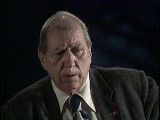
-
Robert Mills Donihi describes witnesses at the postwar US trials in Germany
Oral HistoryIn 1945, Robert Mills Donihi was practicing law in Nashville, Tennessee. He accepted a government assignment to Tokyo where he worked on the trial of 28 high-ranking Japanese officers. After a year, he left for Germany, and arrived in Nuremberg in January 1947. Donihi was a member of the legal team at the postwar US trials in Germany, serving as both an interrogator and a prosecutor.
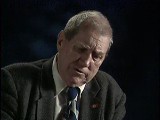
-
Henry J. Kellermann describes the reactions of defendants during the Nuremberg Trial
Oral HistoryHenry received a Doctor of Law (J.D.) degree from the University of Berlin in 1937. Sponsored by the rabbi of the Baltimore Hebrew congregation, Henry immigrated to the United States in the same year. In 1945, the Office of Strategic Services (OSS) assigned him to prepare pre-trial briefs for the International Military Tribunal held in Nuremberg, Germany. He interrogated a number of witnesses and defendants. After the war, he held various diplomatic posts.
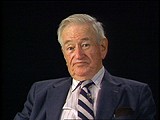
-
Martin Spett describes a massacre of Tarnow Jews
Oral HistoryThe Germans occupied Tarnow in 1939. In 1940 Martin and his family were forced out of their apartment. During the first massacre of Jews, Martin hid in an attic. The family hid during two more roundups. In May 1943 they were registered, allegedly to be exchanged for German prisoners of war, because Martin's mother was born in the United States. They were taken by train to Krakow and then to the Bergen-Belsen concentration camp. Martin was liberated in 1945 and he moved to the United States in 1947.
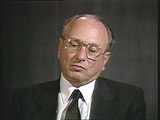
-
The Warsaw Ghetto
Animated MapView an animated map showing key events in the history of the Warsaw ghetto, the largest ghetto established by the Germans in occupied Europe.
